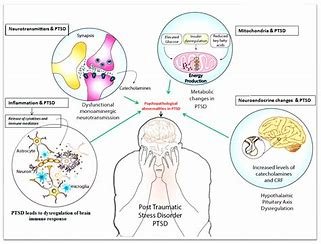Post-traumatic stress disorder (PTSD) affects millions of individuals worldwide, causing debilitating symptoms and hindering their quality of life. However, recent groundbreaking research conducted by Virginia Tech researchers has shed light on a remarkable discovery that could pave the way for more effective therapeutic treatments for PTSD, particularly in females.
At the center of this discovery is a protein called ubiquitin, aptly named for its ubiquitous presence across various life forms. Typically, ubiquitin is known for its role in marking other proteins for degradation within cells. But the researchers found that a specific form of this protein, known as K-63, exhibits a distinct function in the female brain—it helps regulate events in memory formation that contribute to PTSD.
Dr. Tim Jarome, an associate professor at Virginia Tech, expressed his surprise at the protein’s unexpected involvement in PTSD regulation in females. “Oftentimes, molecules involved in fear-based memory formation are found in both sexes, but this is the first time we’ve discovered one that is selectively involved in one sex,” said Dr. Jarome. “This particular mechanism appears to be specific to females, who are more likely to develop PTSD.”
The research, led by Ph.D. candidate Kayla Farrell, focused on understanding how the K-63 form of ubiquitin influences fear-based memories in female brains. By manipulating this protein, the researchers discovered its selective role in forming these memories. This finding opens up new possibilities for targeted therapeutic interventions, especially in cases where current treatment options have proven inadequate.
Presently, treating PTSD poses significant challenges, and the success rate of existing approaches remains suboptimal. By identifying a specific molecule, such as the K-63 ubiquitin, researchers can potentially develop pharmacological interventions tailored to address the unique needs of individuals with PTSD, particularly females.
Dr. Jarome emphasizes that personalized treatment for PTSD may be necessary, given that the disorder varies among patients and is more prevalent in females. This newfound mechanism could serve as a crucial target for designing treatment strategies that specifically address the underlying factors contributing to PTSD in females.
The implications of this research are profound, offering hope for improved therapeutic outcomes and a better understanding of how PTSD operates in the female brain. By unraveling the complex interplay between proteins and memory formation, scientists are moving closer to unlocking the mysteries of PTSD and developing more effective treatments for those affected by this debilitating condition.
As further research unfolds, the identification of this specific protein’s role in regulating PTSD memories in females marks a significant milestone in the field. It not only highlights the importance of considering sex-specific factors in mental health research but also underscores the potential for targeted interventions that can make a lasting impact on the lives of individuals living with PTSD.

